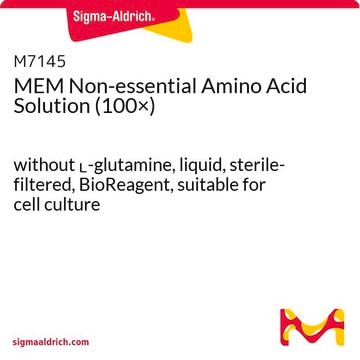M4655
Medio esencial mínimo Eagle
With Earle′s salts, L-glutamine and sodium bicarbonate, liquid, sterile-filtered, suitable for cell culture
Sinónimos:
MEM
About This Item
Productos recomendados
Quality Level
sterility
sterile-filtered
form
liquid
technique(s)
cell culture | mammalian: suitable
impurities
endotoxin, tested
components
sodium pyruvate: no
phenol red: yes
Earle’s salts (5% CO2): yes
HEPES: no
NaHCO3: yes
L-glutamine: yes
shipped in
ambient
storage temp.
2-8°C
¿Está buscando productos similares? Visita Guía de comparación de productos
General description
MEM, which incorporates these modifications, includes higher concentrations of amino acids so the medium more closely approximates the protein composition of cultured mammalian cells. MEM has been used for cultivation of a wide variety of cells grown in monolayers. Optional supplementation of non-essential amino acids to the formulations that incorporate either Hanks′ or Earle′s salts has broadened the usefulness of this medium.
Application
Other Notes
also commonly purchased with this product
related product
Storage Class
12 - Non Combustible Liquids
wgk_germany
WGK 1
flash_point_f
Not applicable
flash_point_c
Not applicable
Certificados de análisis (COA)
Busque Certificados de análisis (COA) introduciendo el número de lote del producto. Los números de lote se encuentran en la etiqueta del producto después de las palabras «Lot» o «Batch»
¿Ya tiene este producto?
Encuentre la documentación para los productos que ha comprado recientemente en la Biblioteca de documentos.
Los clientes también vieron
Artículos
Calcium is an ionically stable divalent cation with important beneficial and toxic properties in cell culture. It is a component of a wide range of cell culture media.
Calcium is an ionically stable divalent cation with important beneficial and toxic properties in cell culture. It is a component of a wide range of cell culture media.
Calcium is an ionically stable divalent cation with important beneficial and toxic properties in cell culture. It is a component of a wide range of cell culture media.
Calcium is an ionically stable divalent cation with important beneficial and toxic properties in cell culture. It is a component of a wide range of cell culture media.
Nuestro equipo de científicos tiene experiencia en todas las áreas de investigación: Ciencias de la vida, Ciencia de los materiales, Síntesis química, Cromatografía, Analítica y muchas otras.
Póngase en contacto con el Servicio técnico






